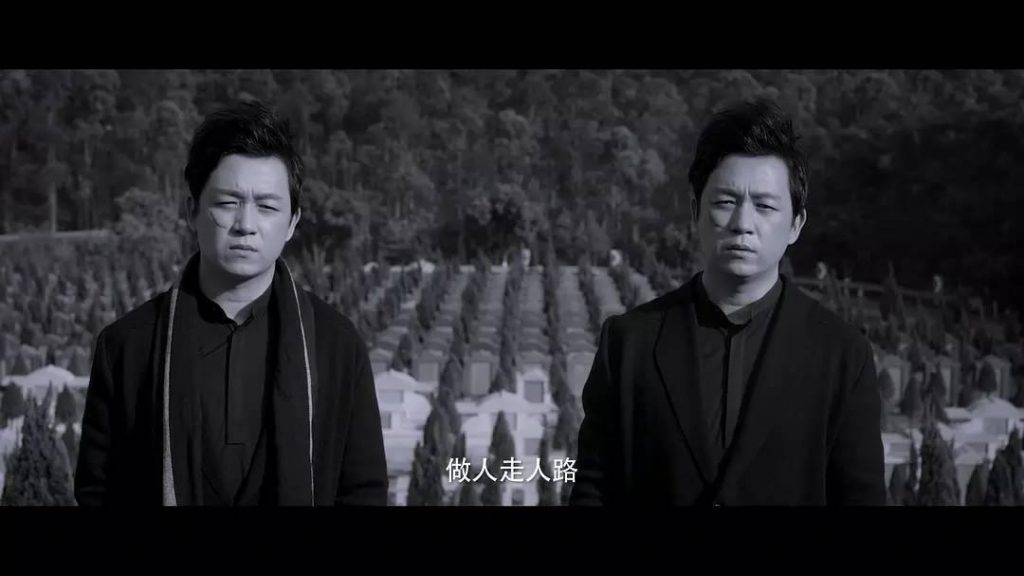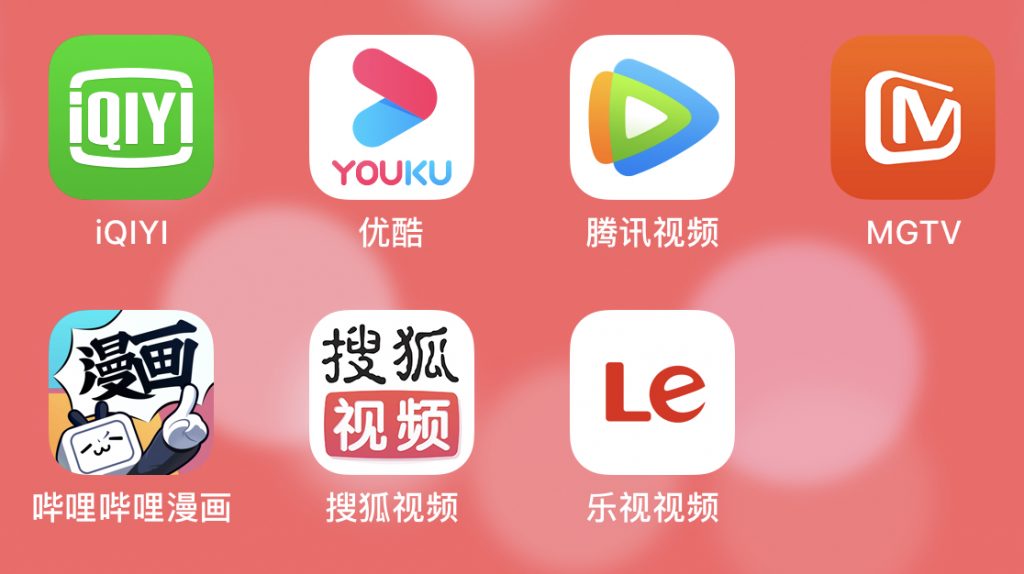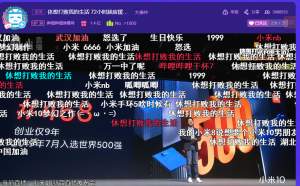
A vertical drama offering from iQiyi reflects the rise of mobile viewing.
In the first half of this two-part series, we looked at some of the broad industry considerations that brand owners should be aware of as they consider working with Chinese video streaming services. This week, we look at a group of seven key players — from the well-established iQiyi to up-and-coming challenger Xigua Video (a Bytedance company) — and share insights on their business models and prospects in the fast-changing market.

iQiyi mega-hit “Rap of China” brought hip-hop into the mainstream
iQiyi
Background: Founded in 2010 by internet search giant Baidu, iQiyi is most often referred to as the “Netflix of China,” a not entirely accurate comparison, since iQiyi is controlled by a larger tech firm, offers a free, ad-supported viewing option, and is worth far less than Netflix.
But Baidu’s fortunes have fallen as a result of declines in the broader ad industry fueled by an economic slowdown, and the trend is for remaining ad money to move away from search. Baidu’s reputation has also been hit by repeated scandals involving its paid search results. Over the long term, it remains to be seen whether Baidu’s troubles will affect iQiyi’s budget, as has been the case with other streaming services such as Sohu and Le.com.
User base (mid-2019): 538 active monthly users and 100 million subscribers (98% paid).
Content focus: iQiyi leads the Chinese market for online dramas. The service moved away from a reliance on Korean content in the aftermath of a politically-driven ban on most things South Korean back in 2016, and has more recently promoted its own blockbusters, such as the hit political costume drama “The Story of Yanxi Palace” (延禧攻略). iQiyi is leading a push into interactive video — it launched a pilot for an interactive drama in June and produced the first interactive online video ad in August.
Major hit: Hip-hop talent competition “Rap of China” (中国有嘻哈 / 中国新说唱, see our recent case study on brand presence throughout its three seasons to date).
Pros: Commitment to content spending (both original IP and licensing), which has emphasized the development of new formats that bring subcultures into the mainstream.The focus on interactive content can also leverage Baidu’s expertise in AI to collect and analyze relevant consumer data from viewers.
Cons: Parent Baidu lacks the expansive, multi-platform digital footprint of rivals Alibaba and Tencent and looks to be past its prime, with some suggesting that it’s time for the “B” in BAT to be replaced by TikTok parent Bytedance, the super-unicorn now estimated to be worth about twice as much as Baidu.

Youku has won acclaim for realistic dramas such as “Day and Night”
Youku
Background: The OG “Chinese Youtube,” launched in 2006 as a hub for user-generated content (and plenty of pirated video thrown in). At its peak, Youku was the top online video platform in China, a position it boosted through a merger with rival Tudou in 2012. Alibaba acquired the company in 2015 and took it private.
User base: Alibaba doesn’t disclose user numbers for Youku, though it reports that paid subscribers increased by 40% from 2018 to 2019, which is roughly in line with the trend among its competitors. It had 30 million paid subscribers at the end of 2016, the last date such a figure was released.
Content focus: Original content has long played a big role for the streaming service. Prior to Alibaba’s acquisition and privatization, Youku was subject to shareholder scrutiny and lacked a deep-pocketed parent company to fund bidding wars for increasingly expensive overseas content. Nowadays, it has regained some ground on rivals with licensed content such as “The Advisors Alliance” (大军师司马懿 ) and has also created some of the most popular and critically acclaimed original content, including this summer’s top variety show (“Street Dance of China,” 这!就是街舞) and the best-reviewed drama (“Longest Day in Chang’An,” 长安十二时辰).
Major hit: Gritty detective drama “Day and Night” (白夜追凶).
Pros: Opportunities for e-commerce integration on Alibaba’s Taobao and Tmall platforms are expanding, and Youku is poised to reap rewards as the current vogue for “livestreaming + e-commerce” moves onto its platform with more entertaining content.
Cons: Youku lagged behind iQiyi and Tencent Video on spending, and there have been recent rumors of further cutbacks, along with some uncertainty regarding the future of Alibaba’s entertainment sector ambitions following the retirement of Jack Ma.

Talent show “Produce 101” allowed Tencent to leverage its music industry might
Tencent Video
User base: 550 million monthly active users, 96.9 million paid subscribers.
Content focus: International content was once Tencent’s forte: whether it’s foreign-language film and dramas, overseas shows licensed for Chinese remakes, or an exclusive partnership to broadcast NBA games live in China. As with the competition, priorities have shifted markedly in recent years, and original content now prevails, especially in the areas of reality shows and programming based on IP from Tencent’s literature and ACG (anime, comic and games) businesses.
Major hit: Girl-group talent competition “Produce 101” (创造101), developed under license from South Korea’s CJ E&M.
Pros: Tencent has ownership of major businesses across the entertainment sector — in music, gaming, literature, and film — and uses popular IP developed in one sector across others, leveraging the “fan economy” along the way. It also owns the dominant social media platform WeChat, with an enormous user base to draw upon.
Cons: Tencent Video’s original content lack some diversity compared to its rivals, and the reliance on the “fan economy” depends on young viewers, many under 18. Though this demographic is clearly willing to spend to support their favorite celebrities (and the products they endorse), they lack the more significant spending power of older consumers. While WeChat remains the dominant social media app, it is also associated more and more with daily life and work, less so as a destination for entertainment, and faces a significant challenge from Bytedance’s short-video app Douyin/TikTok.

Celebrities solve crime for entertainment in Mango TV’s “Who’s the Murderer”
Mango TV
Background: Established in 2008 to serve as the online presence for the provincial Hunan Broadcasting System, China’s second largest TV network after the centrally operated CCTV. HBS’s national network, Hunan Satellite TV, has played a pioneering role in the development of higher-quality content on Chinese television over the past 20 years. Mango TV has recently come into its own, and is now often discussed in reports about China’s video streaming market alongside its three large rivals.
User base: 120 million monthly active users, 15 million paid subscribers.
Content focus: While it was originally established as an online vehicle for HBS programs, Mango is building an independent reputation for creating a buzzworthy flow of its own dramas and reality shows.
Major hit: Celebrity murder-mystery reality show “Who’s the Murderer” (明星大侦探).
Pros: As the exclusive online destination for HBS, Mango has a steady stream of high-quality, big-budget productions available for less than what rivals pay for similar types of content. It is reported to be the only one of China’s major video streaming services to turn a profit.
Cons: It operates on a much smaller scale than its three big rivals, and Mango’s connection with the Hunan provincial network limits its ability to draw content from other sources.

Bilibili’s documentary series “Story of Chuan’er” engaged viewers with foodie narratives
Bilibili
Background: Despite its youthful orientation, Bilibili is a bit of an old-timer in this industry, having celebrated its 10th anniversary in June. It is the central hub for China’s ACG (anime, comic and games) subculture, and is somewhat notorious for requiring users to pass a 100-question “geek test” in order to become “official members” of the site. (A distinction that carries privileges such as the right to add the platform’s signature “bullet comments” that stream across videos as they play.) Bilibili is also a creative hotbed for China’s active meme culture.
User base: 110 million monthly active users, 5.3 million paying subscribers. Premium members who have passed the 100-question exam enjoy more benefits, while paid subscribers who have not passed the test have limited access to some interactive features such as bullet comments. Bilibili has 54 million members who have passed the exam.
Content focus: Bilibili’s members are its creators, but outside of its original ACG orientation, the network has more recently gained acclaim for original documentary content that appeals to an emerging class of foodies and travelers. It is also investing in content creators with a particular emphasis on the current vogue for vlogs in the Chinese market, and may be best positioned to become China’s next YouTube since — as yet — there are no pre-video ads on Bilibili. (Youtube has been blocked in China since 2009.) Brands seeking to reach young, hip consumers have been paying attention in growing numbers.
Major hit: Street-food documentary series “Story of Chuan’er” (人生一串).
Pros: A highly engaged and loyal community of users who appreciate its unique content offerings. Fast-rising revenues and potential for further growth.
Cons: A relatively small user base, though Bilibili recently announced that it would ease its membership test requirements, paving the way for a rise in paying subscriber numbers.

“Driving You Home” is part of Sohu TV’s “small and beautiful” content strategy
Sohu TV
Background: Owned by one of China’s first big internet companies, web portal Sohu, this video site was one of the biggest players in the online video market just a few years ago, paying top dollar for hit foreign series such as Netflix’s “House of Cards.” But that spending exacerbated losses incurred by parent Sohu, which fell behind as its competitors poured attention and funding into mobile, and has forced a change in strategy for the video service.
User base: No recent data is available, but it reported 39.6 million monthly active users in August 2018.
Content focus: Sohu TV announced a “small and beautiful” content plan last year to emphasize self-produced shows with lower budgets, eschewing expensive celebrities and licensed content. This year it has updated its strategy to include short-video projects as well. Some of its series have been critically well received, such as “Well Intended Love” (奈何BOSS要娶我) which has been picked up by Netflix for overseas distribution.
Major hit: “Driving You Home” (送一百位女孩回家), a reality series about the lives of urban women.
Pros: Well developed channels for producing original content targeting specific audience groups.
Cons: Smaller audience numbers create a challenge to reach a mass audience, and Sohu is unable to compete with the vast resources of its competitors.

“Top Task” marked a turning point for Xigua Video to move into original content
Xigua Video
Background: Launched by Bytedance in 2016 as Toutiao Video and rebranded a year later, Xigua has primarily served as a platform for user-created short videos. The name Xigua, which means “watermelon,” refers to the popular Chinese term “watermelon-eating crowd” (吃瓜群众),or onlookers who just want to watch events unfold without getting involved. Key factors that distinguish Xigua from Douyin (TikTok) are the longer length of user videos (at least several minutes long), their organization into distinct categories (making it easier to find videos by topic or interest), and less of an emphasis on setting videos to music.
User base: 169 million monthly active users, 0 paid.
Content focus: Xigua may be going through a transitional phase as the service branches out from user-generated short videos and livestreaming into developing its own reality shows and original dramas, but generally with shorter episodes than traditional programming. This comes as Douyin is testing longer short-video options with some of its users.
Major hit: Interactive problem-solving variety show “Top Task” (头号任务).
Pros: With Bytedance’s formidable AI behind it, data collected directly from Xigua Video users can be used to guide production of original content. Bytedance has also shown how capable it is of spending heavily to acquire users, with a track record of success at home with Douyin and news aggregator Jinri Toutiao, and globally through TikTok.
Cons: Users tend to come to Xigua for humorous videos, and reliance on Xigua’s algorithms could limit the diversity of original content offerings.







